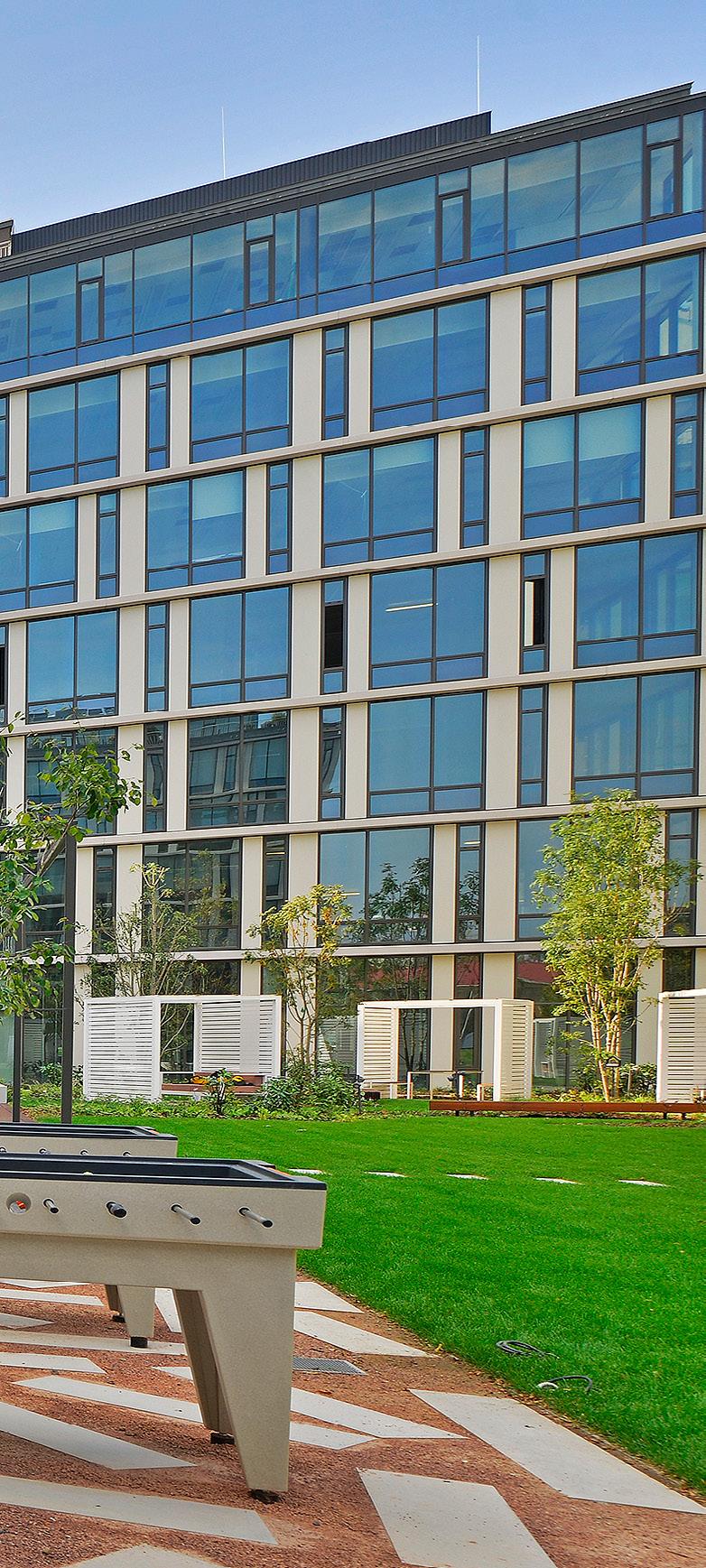
5 minute read
Conditions Improving
Magyar Telekom HQ Inner court.
FINANCING TERMS AND CONDITIONS IMPROVING In general, finance is seen as more readily available on more favorable terms as there are four or five lenders active on the Hungarian market, competing to provide finance for what are considered to be the best projects.
By Gary J. Morrell
Obviously, it is developers with the best track records that are able to source finance on the most favorable conditions. Those established developers who utilize debt finance on their projects have built up close relationships with lending banks.
Horizon Development (through SZ8 Real Estate Development Investment Fund, owner of the Szervita Square development and 100% owned by Horizon Development) has signed a financing agreement with UniCredit Bank Hungary for the development of the mixed-use, 15,000 sqm project.
involved in the best development projects as a financing partner. After two previous successful cooperations, Szervita Square is our third project with Horizon Development,” comments Gábor Pető, real estate financing director of UniCredit Bank Hungary.
With increased market liquidity and positive demand and supply fundamentals in the Budapest office market, developers are now able to sell product to developers at an earlier stage in the development process.
SELF-FINANCED Both Skanska and Atenor finance their projects from their own resources. But while developers such as GTC opt
Magyar Telekom HQ.

to maintain projects they have built, Skanska has the policy of exiting a few months after completion, once it is close to fully let. The company has delivered its eighth Budapest office project, the speculative 35,000 sqm
Mill Park in District IX. The LEED “Gold” accredited complex has already been sold to Erste Real Estate.
Latest Budapest Skanska delivery, Mill Park.

and has successfully sold different phases of Váci Greens to Hungarian and Slovak investors.
“Financing is available on more favorable terms and we are getting very good proposals, but normally Atenor finances its projects from its own equity. Significantly, the approximately 40% increase in construction costs and 20-30% increase in labor costs is resulting in more expensive developments. The good news is that rents are also showing a remarkable increase,” says Nikolett Püschl, development and leasing director at Atenor Hungary.
The established Hungarian developer Futureal has agreed a EUR 32 million loan agreement with K&H Bank for the 20,000 sqm Advance Tower office development in Váci út. The complex is valued at EUR 68 mln.
Futureal has also concluded a EUR 150 mln financing agreement with UniCredit Bank and Erste Group for the development of the 53,000 sqm Etele Plaza. This latter
project also includes the 65,000 sqm Budapest One office park.
Wing has completed the 58,000 sqm Magyar Telekom Group headquarters, located in District IX. The circa HUF 50 billion project was financed by Wing’s own equity and a consortium of banks consisting of UniCredit Bank Hungary and K&H Bank.
FINANCING AVAILABLE “For good projects sponsored by a company like ours, financing is

“Hungary and Romania are the two countries in the Central European region where there is room for more yield compression in contrast to Czech and Poland. I think that yields for Hungary are much higher than the risk and therefore there is the possibly of a risk premium. I think that the gap is wider than it should be, so there will be further interest in Hungary that will fuel further yield compression.”
available. We work with a variety of different banks such as UniCredit, KBC Bank, Raiffeisen Bank, Erste and OTP,” commented Noah Steinberg, chairman and CEO of Wing.
Debt finance for Hungary is more expensive than in Czech Republic and Poland as lenders take into consideration the perceived country risk when making a decision on a project.
The yield gap of about 100-150 basis points between Hungary and Czech Republic is in part due to the higher cost of finance. The differential in the cost of lending between Hungary and Czech is estimated at 30-40% basis points as Czech and Slovak banks are more liquid and there is more pressure on them to invest than in Hungary.
Although deals are obviously concluded on a case-by-case basis, the equity requirement on a development for Hungary is put at around 30%, with a prelease requirement of around 50%. higher than the risk and therefore there is the possibly of a risk premium. I think that the gap is wider than it should be, so there will be further interest in Hungary that will fuel further yield compression,” Számely adds.
“We have recently completed a transaction in the office sector and our portfolio in Hungary essentially consists of office and retail where we have two projects in our portfolio. We would also do logistics if we had the opportunity,” he continues.
“As lenders we are following our clients and with regard to Hungary I see that the fundamentals are very good and economic development is there,” explains Péter Számely, head of CEE and SEE at the Vienna-based lender, Hypo Noe Gruppe Bank.
RATING IMPROVEMENTS “The country is improving in the view of rating agencies and this is a good basis for further development of the markets [here]. Hungary and Romania are the two countries in the Central European region where there is room for more yield compression in contrast to Czech Republic and Poland. I think that yields for Hungary are much “For very good assets there is strong competition from local banks. I think that the markets in Hungary are promising and if there are no external shocks then this year will be a very good year. The number of competing banks depends on the funding strategy of the client and I know clients that are inviting five banks. For good assets there is enough interest from lenders,” Számely says.
One area where there is still room for improvement in terms of lending options comes from Germans banks that are active in Poland and Czech Republic but have still not returned to the Hungarian market.










